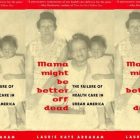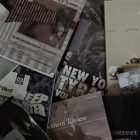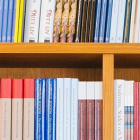Literary Enemies: Ann Patchett v. Zadie Smith
Literary Enemies: Ann Patchett vs. Zadie Smith
Disclaimer: Zadie Smith doesn’t care if she has enemies.
I have a recurring dream in which I meet Zadie Smith at a picnic. She compliments my leather jacket—Vintage? she asks—and we begin chatting, and in the end she offers to be my mentor. She’ll teach me how to be a woman writer, she says, and I wake up full of confidence. Zadie knows everything. Zadie will guide me. But when I’m fully awake and I need advice or recognition or consolation, I don’t go to Zadie Smith’s work. Instead, I read Ann Patchett.
Zadie Smith and Ann Patchett are both phenomenal novelists and essayists. They are both contemporary female literary writers who get consistent critical attention. Smith is more given to playing with form and structure than Patchett, but I wouldn’t call either one experimental. And both write ambitiously, but in opposite ways. Zadie Smith makes the small big, and Ann Patchett makes the big small.
Let me show you what I mean. Here’s Samad Iqbal, one of the several protagonists of Smith’s debut White Teeth. He’s talking to a woman with whom he plans to cheat on his wife; she’s just bought him something, and is about to show him what she bought. As she searches for the gift in her purse,
two things happened.
1.1 Samad closed his eyes and heard the words ‘To the pure all things are pure ‘and then, almost immediately afterwards, ‘Can’t say fairer than that.’
1.2 Samad opened his eyes and saw quite clearly by the bandstand his two sons, their white teeth biting into two waxy apples, waving, smiling.And then Poppy resurfaced, triumphant, with a piece of red plastic in her hand.
‘A toothbrush,’ she said.
In most writers’ work, and in most of our lives, this moment would count for nothing. Most writers would plant Samad’s sons elsewhere in the scene, during a kiss, maybe, or as Samad and Poppy stand to go home together. But Smith takes the quickest, most practical bit of their pre-tryst—I bought you a toothbrush, since you’re going to sleep over—and uses it to blow the relationship up.
Zadie Smith lives in detail. She piles detail on the reader, expanding small moments and small places until they become the whole world. Her newest novel, NW, takes this as its project. Using four characters and a handful of streets and bus routes, Smith makes a corner of London feel enormous. In her recent story “Miss Adele Amidst The Corsets,” she does the same with New York, in the guise of one character running an errand. This is Smith on how small Miss Adele feels, how small her life is:
“Work, paycheck, apartment, the various lifestyle sections of the Times, Turner Classic Movies, Nancy Grace, bed. Boom. Maybe a little Downton. You needn’t put your face on to watch Downton. That was her routine, and disruptions to it—like having to haul ass across town to buy a new corset—were rare.”
And still, by the end, her story feels huge.
Ann Patchett is much more restrained. She likes the singular, well-chosen detail. She dips her toe where Smith wallows. Yet her plots and her settings are infinitely bigger. In State of Wonder, a biologist discovers the key to eternal childbearing in the Amazon; in Bel Canto, terrorists take the guests at a lavish birthday party hostage. These stories would be too much for Smith’s writing. Made enormous, they would feel cartoonish, unbelievable. They need to be made small enough for us to empathize, and Patchett, who has a gift for reducing without being reductive, does just that. Listen to the hostages, communally, the first night of the kidnapping in Bel Canto:
“It was surprising how much more they could hear now that they were lying down. They had the time to concentrate—yes, there went the shuffling of feet, that was the sound of a baton being smacked into an open palm. The ceiling had been memorized…and so guests closed their eyes.”
Zadie Smith writes with swagger. This is why I dream about her. She is a woman and a writer who I wish I could be, but even her essays about writing don’t tell me how. She’s a colossus. I don’t mean to say that Ann Patchett is any less accomplished, or that I admire her any less, but she gives me a foothold. Sometimes I recognize myself in her essays, and the rest of the time I imagine myself there. Wish you could see all this by yourself, don’t you? Smith asks the reader, while Patchett takes the reader’s hand and points: Look. Here it is. Both are important. Reading them both teaches us new ways to see.




